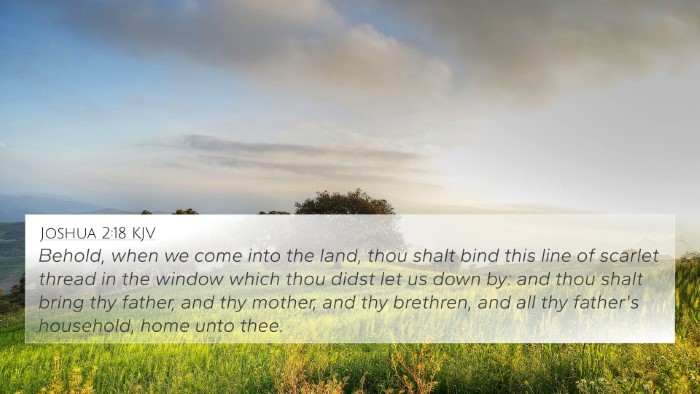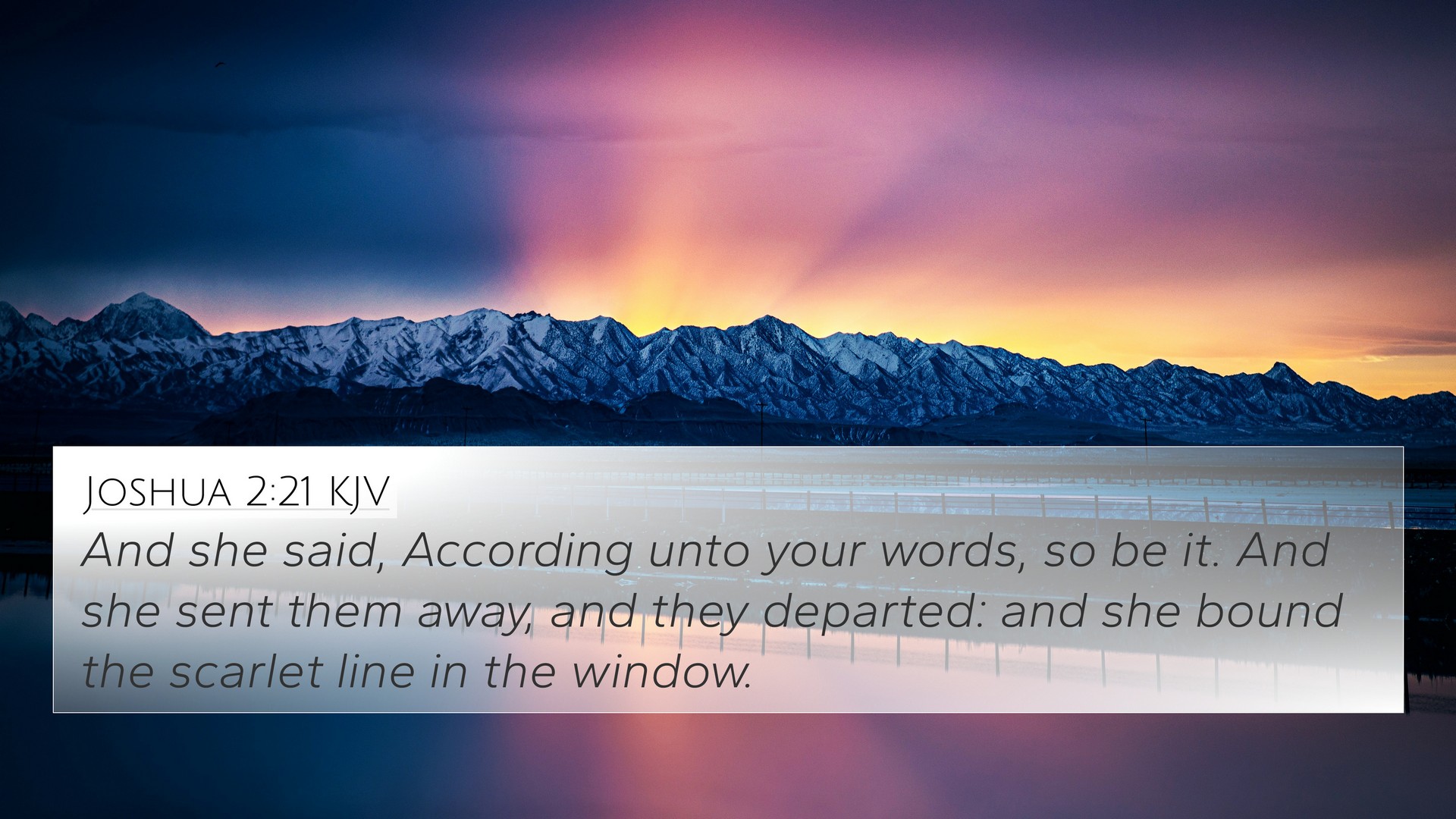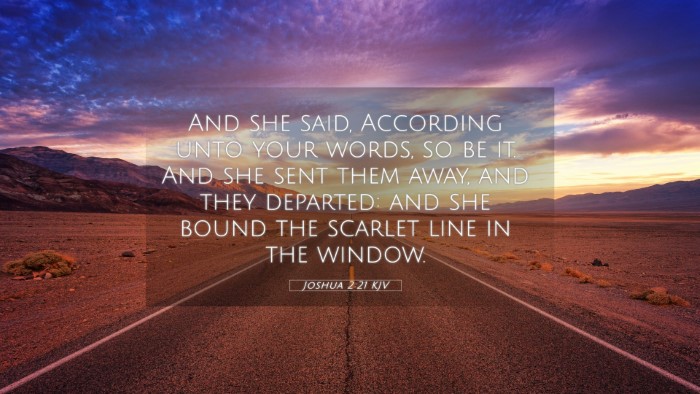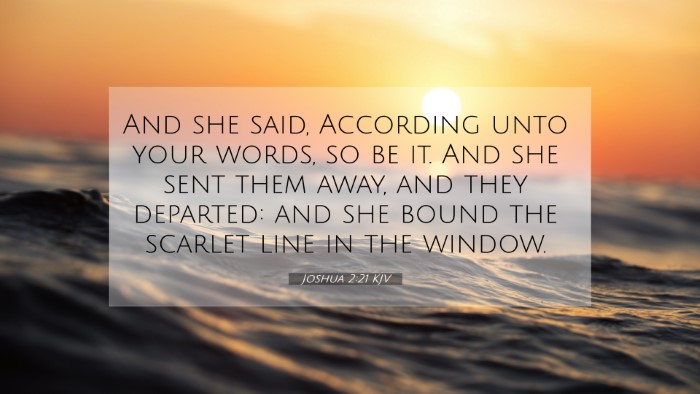Old Testament
Genesis Exodus Leviticus Numbers Deuteronomy Joshua Judges Ruth 1 Samuel 2 Samuel 1 Kings 2 Kings 1 Chronicles 2 Chronicles Ezra Nehemiah Esther Job Psalms Proverbs Ecclesiastes Song of Solomon Isaiah Jeremiah Lamentations Ezekiel Daniel Hosea Joel Amos Obadiah Jonah Micah Nahum Habakkuk Zephaniah Haggai Zechariah MalachiJoshua 2:21 Similar Verses
Joshua 2:21 Cross References
And she said, According unto your words, so be it. And she sent them away, and they departed: and she bound the scarlet line in the window.
Uncover the Rich Themes and Topics of This Bible Verse
Listed below are the Bible themes associated with Joshua 2:21. We invite you to explore each theme to gain deeper insights into the Scriptures.
Joshua 2:21 Cross Reference Verses
This section features a detailed cross-reference designed to enrich your understanding of the Scriptures. Below, you will find carefully selected verses that echo the themes and teachings related to Joshua 2:21 KJV. Click on any image to explore detailed analyses of related Bible verses and uncover deeper theological insights.

Joshua 2:18 (KJV) »
Behold, when we come into the land, thou shalt bind this line of scarlet thread in the window which thou didst let us down by: and thou shalt bring thy father, and thy mother, and thy brethren, and all thy father's household, home unto thee.

Matthew 7:24 (KJV) »
Therefore whosoever heareth these sayings of mine, and doeth them, I will liken him unto a wise man, which built his house upon a rock:
Joshua 2:21 Verse Analysis and Similar Verses
Understanding Joshua 2:21
Joshua 2:21 states: "And she said, According unto your words, so be it. And she sent them away, and they departed: and she bound the scarlet line in the window." This verse captures a pivotal moment in the story of Rahab and the Israelite spies, reflecting themes of faith, obedience, and the role of divine providence.
Summary and Interpretation
The context of Joshua 2 revolves around the Israelite spies sent to Jericho, where they encounter Rahab, a Canaanite woman who shelters them. This interaction is loaded with theological implications, as it demonstrates the intersection of God's promise and human agency. Rahab's response to the spies—affirming their words and displaying an act of faith by tying a scarlet cord—symbolizes her belief in their message and her desire for salvation.
Key Themes
- Faith and Obedience: Rahab's actions demonstrate a profound faith in God, despite her background. Her binding of the scarlet line signifies a tangible expression of her trust in God's plan.
- Divine Mercy: The scarlet cord represents not only Rahab's salvation but also God's mercy extending to those who believe, regardless of their past.
- Fulfillment of Promises: This act highlights God's faithfulness in fulfilling His promises to His people, as seen through Rahab’s protection during the fall of Jericho.
Commentary Insights
Matthew Henry notes that Rahab's willingness to protect the spies symbolizes her recognition of the power of the God of Israel. Her acceptance of their words and the binding of the scarlet line not only showcased her faith but also her cleverness in securing her family's safety. He compares her faith to that of other Biblical figures, emphasizing its significance in the story of salvation.
Albert Barnes emphasizes the importance of the scarlet cord as a sign of hope and deliverance. He relates her actions to the Passover, where blood marked the homes of the Israelites for protection. This connection illustrates the overarching theme of God safeguarding His people through faith and outward signs of obedience.
Adam Clarke provides additional insights into her character, suggesting that Rahab represents all who turn to God in faith, despite their past. He highlights that God often chooses the seemingly unworthy to accomplish His purposes, thus reminding readers of the vastness of God’s grace.
Cross-References and Related Verses
This verse connects with several significant Bible verses, providing a deeper understanding through cross-references:
- Hebrews 11:31: "By faith the harlot Rahab perished not with them that believed not, when she had received the spies with peace."
- James 2:25: "Likewise also was not Rahab the harlot justified by works, when she had received the messengers, and had sent them out another way?"
- Exodus 12:13: "And the blood shall be to you for a token upon the houses where ye are: and when I see the blood, I will pass over you, and the plague shall not be upon you to destroy you."
- Romans 10:13: "For whosoever shall call upon the name of the Lord shall be saved."
- Joshua 6:25: "And Joshua saved Rahab the harlot alive, and her father's household, and all that she had; and she dwelleth in Israel even unto this day."
- Matthew 1:5: "And Salmon begat Booz of Rahab; and Booz begat Obed of Ruth; and Obed begat Jesse."
- Galatians 3:26-29: "For ye are all the children of God by faith in Christ Jesus... there is neither Jew nor Greek, neither bond nor free, neither male nor female: for ye are all one in Christ Jesus."
Conclusion
The significance of Joshua 2:21 extends beyond the historical narrative, inviting believers to reflect on themes of faith, God's mercy, and salvation. Rahab's story encourages all individuals—from diverse backgrounds—to step into faith and experience the transformative power of God's promises. Through understanding this verse, one can appreciate the interconnectedness of the Biblical text, evidenced by its relationships with numerous other verses and themes throughout Scripture.



